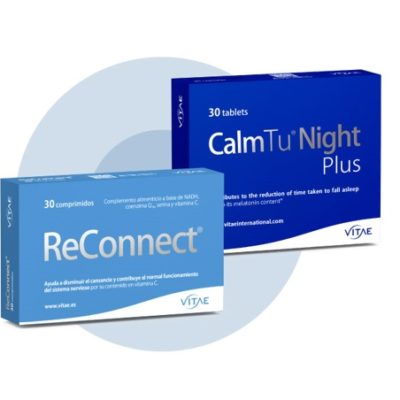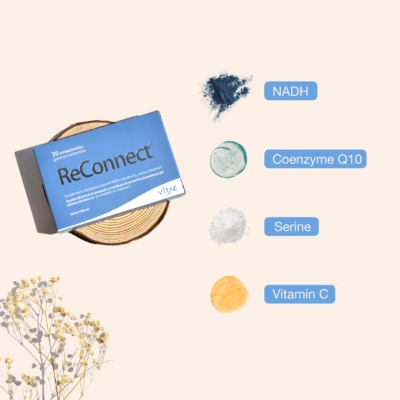Cortisol, known as the ‘stress hormone’, plays a vital role in our bodies, but its levels are often too high. We live in a world where stress is part of our lives and cortisol is a constant companion in everyone’s body. In this article we explain how to lower cortisol in a natural way.
What is cortisol and why can it be a problem?
Cortisol is a hormone produced by the suprarenal glands that regulates essential functions such as stress response, energy levels and metabolism. Although crucial in small amounts, too much cortisol can be detrimental to health.
Chronic stress, lack of sleep or poor diet are some of the most common causes of elevated cortisol levels. If left unchecked, it can trigger a range of problems, such as chronic fatigue, anxiety and difficulty maintaining a healthy weight.
Common symptoms of high cortisol
When cortisol remains elevated, the body starts to show warning signs. Here are some of the most common symptoms:
– Constant fatigue: You feel exhausted even after sleeping.
– Sleep problems: Insomnia or difficulty falling asleep.
– Weight gain: Especially in the abdominal area.
– Digestive problems: Indigestion or frequent gastric discomfort.
– Anxiety and dizziness: Many people experience anxiety dizziness related to elevated cortisol levels.
– Concentration problems: Difficulty maintaining attention or remembering things.
If you have several of these symptoms, it is important to take actions to reduce cortisol effectively.
How to know if your cortisol is high
Are you unsure if your cortisol levels are normal? One accurate way to find out is to perform laboratory tests, such as blood, saliva or even urine tests. These tests measure cortisol levels at different times of the day to assess whether they are within healthy ranges.
In addition to medical tests, pay attention to key signs, such as constant stress, extreme tiredness and difficulty relaxing, which could be indicators of elevated cortisol. Consultation with a health professional is an essential step if you suspect you have this problem.
What happens to your body when you have excess cortisol?
Too much cortisol not only affects your daily energy, but can also have serious long-term consequences. Here’s how it impacts on different systems in the body:
– Immune system: Elevated cortisol levels suppress the immune response, making you more prone to infections.
– Metabolism: Can cause weight gain, abdominal fat accumulation and insulin resistance.
– Nervous system: Affects memory, concentration and can increase feelings of anxiety.
– Cardiovascular system: Can raise blood pressure and increase the risk of heart disease.
Taking actions to reduce cortisol not only improves your overall health, but can also prevent long-term complications.
Natural solutions for lowering cortisol
Lifestyle changes
Incorporating healthy habits into your daily routine can make a big difference:
– Engage in moderate exercise, such as walking or yoga.
– Spend at least 10 minutes a day meditating or practising mindful breathing techniques.
– Prioritise sleep, making sure you get at least 7-8 hours of sleep each night.
Diet and key nutrients
Certain foods are especially helpful in regulating cortisol:
– Fruits rich in vitamin C, such as oranges and kiwis.
– Fish rich in omega-3, such as salmon.
– Foods rich in magnesium, such as almonds and spinach.
Avoid excess caffeine and refined sugars, which can exacerbate cortisol levels.
Infusions and natural remedies
Plants such as ashwagandha, ginseng and chamomile have relaxing properties and can help reduce cortisol. Drinking a cup of tea from these plants before bedtime can promote restful sleep.
Premium supplements as an innovative solution
In addition to lifestyle changes, high-end dietary supplements can offer an advanced solution for managing cortisol.
Vitae’s ReConnect is a supplement specifically designed to combat the effects of chronic stress. Its formula, which includes NADH, Coenzyme Q10, Serine and B vitamins, helps reduce fatigue, improve mental clarity and balance cortisol levels in the body.
With ingredients supported by science, ReConnect is an ideal choice for those seeking an effective, premium wellness solution.
FAQs: Answers to the most common questions about cortisol
Foods that help lower cortisol: Those rich in antioxidants, omega-3s and magnesium, such as dark chocolate, nuts, avocado, bananas, salmon and green tea. Complex carbohydrates, such as oats and quinoa, can also help.
Time to reduce cortisol with lifestyle changes: This may vary from person to person, but with good stress management, balanced diet, moderate exercise and adequate rest, improvements can be seen within weeks to a few months.
Safety of supplements to control cortisol: Any type of supplement you choose to take to supplement any situation, it is advisable to consult a health professional.
Relationship between dizziness due to anxiety and high cortisol: Yes, high cortisol can affect blood pressure and the nervous system, which can cause dizziness, especially in situations of stress or anxiety.
In Vitae we care about your health and that is why we try to offer the best of us, contributing ideas of value for your day to day. Many times, in order to achieve full wellbeing, supplementation is necessary, and here we tell you our proposal.
Vitae Proposal
Lowering cortisol is essential to maintaining a balanced and healthy life. With small changes to your daily routine and the help of advanced products like ReConnect, you can manage the effects of stress and improve your quality of life.
Find out more about ReConnect and how it can help you transform your wellbeing here.






